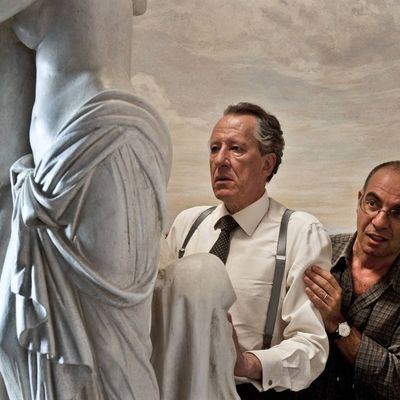
Set in the elegant world of high-end art and antique dealers, Giuseppe TornatoreÔÇÖs The Best Offer is a romantic thriller that plays out like a cross between Hugo and Vertigo, with a bit of Her thrown in. ItÔÇÖs the fablelike tale of Virgil Oldman (a compellingly agitated Geoffrey Rush), a world-class auctioneer and appraiser with an uncanny eye for overlooked treasures. He can quickly tell if a nondescript slab of wood has a Renaissance painting hidden beneath it, or if a random piece of metal discarded in a corner might have belonged, once upon a time, to some wondrous (and valuable) contraption. And like most movie savants of this type, he also canÔÇÖt stand people. But, as you might expect, thatÔÇÖs about to change.
Enter Claire Ibbetson (Sylvia Hoeks), a mysterious heiress who refuses to go outside or let anyone see her. Seeming to communicate only via phone and through walls, she hires Oldman to evaluate and auction off her estate full of priceless furniture and paintings and arcana  including, most fascinating to him, a set of rusty old gears that may once have belonged to an antique machine, perhaps an automaton. As he catalogs Claires estate, Oldman stashes away more bits and pieces of gears he finds, taking them to his repairman pal Robert (Jim Sturgess) to put together. But before things get too Da Vinci Code on us, Oldman becomes intrigued by the mercurial Claire as well. She has a youngish, alluring voice, with an ever-so-slight accent. Comfortable only in assessing what he can see, our hero finds himself obsessed with this invisible girl, and, with a little advice from the womanizing Robert, he slowly helps Claire come out of her shell 
Ack, IÔÇÖve already said too much. Part of the pleasure in watching The Best Offer is the elegant, unassumingly suspenseful way it unfolds. You never quite know where itÔÇÖs all headed, in part because it never quite tells you what kind of movie it is. I called it a ÔÇ£romantic thriller,ÔÇØ but thereÔÇÖs a lot more movie here than that. Yes, it works the obsession angle, ├á la Vertigo and any number of other films, but at times it also feels like something more subtly cutting ÔÇö a relationship drama about two mismatched, fearful souls who never quite know how to behave around each other. The filmÔÇÖs Old World atmospherics ÔÇö decaying mansions, elegantly appointed auction rooms, etc. ÔÇö help draw us in, to be sure. But itÔÇÖs RushÔÇÖs performance, pitched at the nervous edge between scared uncertainty and romantic possibility, that keeps things emotionally grounded. (It also helps that the film sports a soundtrack by the great Ennio Morricone, whose versatility is in full force here; his lovely score veers between lush romanticism and creeping dread.)
Tornatore, who was one of the more successful foreign directors to release films during the nineties, often likes to depict the clash of the old and the new. But heÔÇÖs a classicist and traditionalist at heart, so his sympathies generally lie with the (sometimes delusional) old men who link us to the past: Philippe NoiretÔÇÖs Alfredo in Cinema Paradiso, Marcello MastroianniÔÇÖs Matteo in EverybodyÔÇÖs Fine (the original, not the De Niro remake). Here, too, he redeems Oldman (ha-ha, get it?), who, for all his paralysis and snootiness, is a figure of pure innocence. His stuffed-shirt paralysis is a byproduct of his fear and inability to connect. At nights he sits in a secret vault full of invaluable master paintings heÔÇÖs acquired over the years, some of them by trickery; the paintings span across the centuries and they all depict beautiful women looking straight out from the canvas. He finds comfort in their questioning, but unchanging gazes. In real life, this would be unnervingly creepy; in this directorÔÇÖs world, itÔÇÖs beautiful, nobly stunted behavior.
The timelessness Oldman responds to in those artworks informs the queasiness he feels around the uncertain figure of Claire, and this tension works, subtly, on us, too. But different viewers will respond to TornatoreÔÇÖs teasings differently: I found myself mostly enraptured and unable to guess what was coming next, though IÔÇÖm sure there are those out there to whom The Best Offer will feel predictable. But none of that quite matters, because even as he loads up on the genre machinations and metaphors, Tornatore is wise enough to stay fixed on the central charactersÔÇÖ ever-evolving pas de deux of attraction and fear. Does The Best Offer ultimately add up to anything? IÔÇÖm not sure. But its stately, romantic suspense is absorbing nonetheless.


